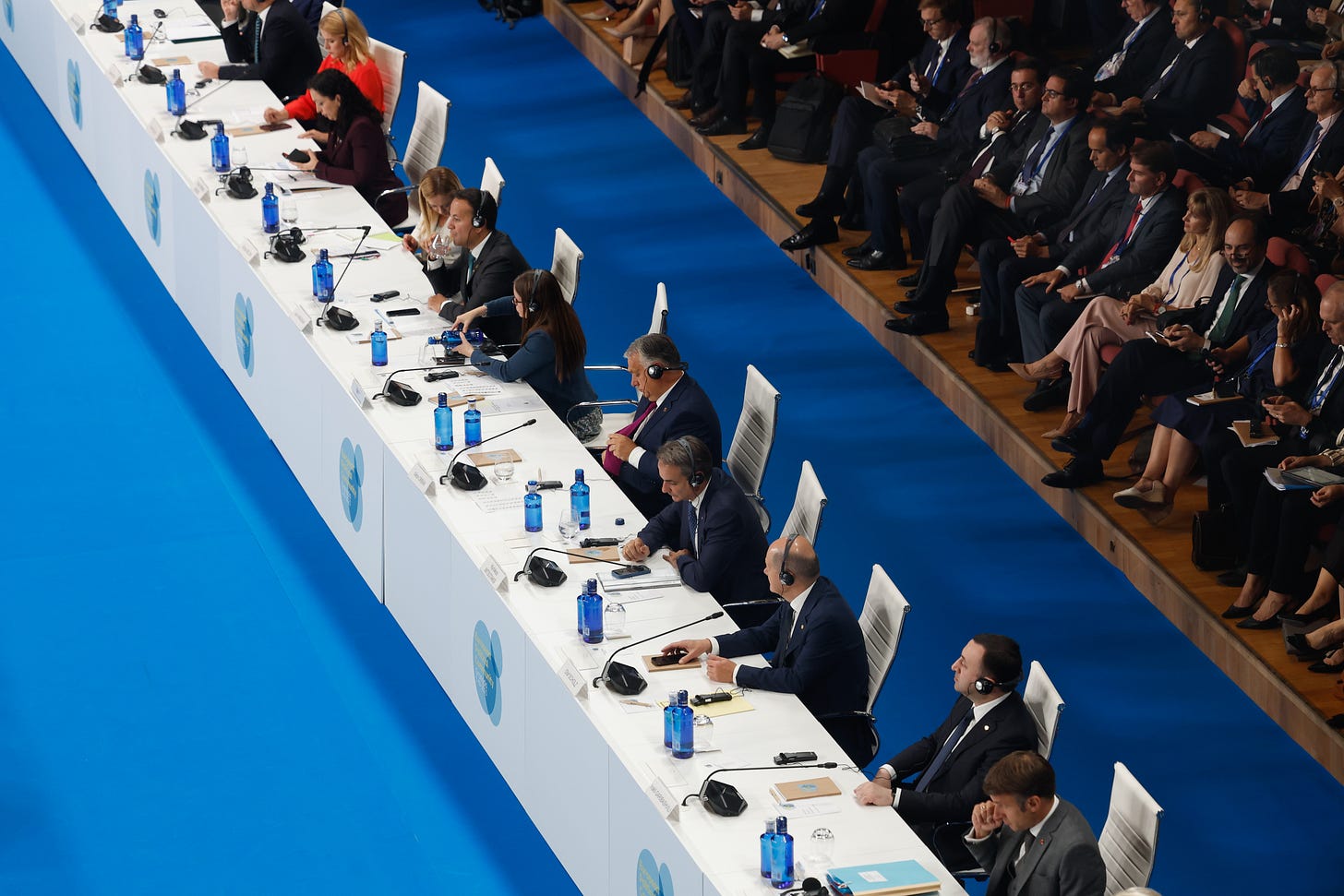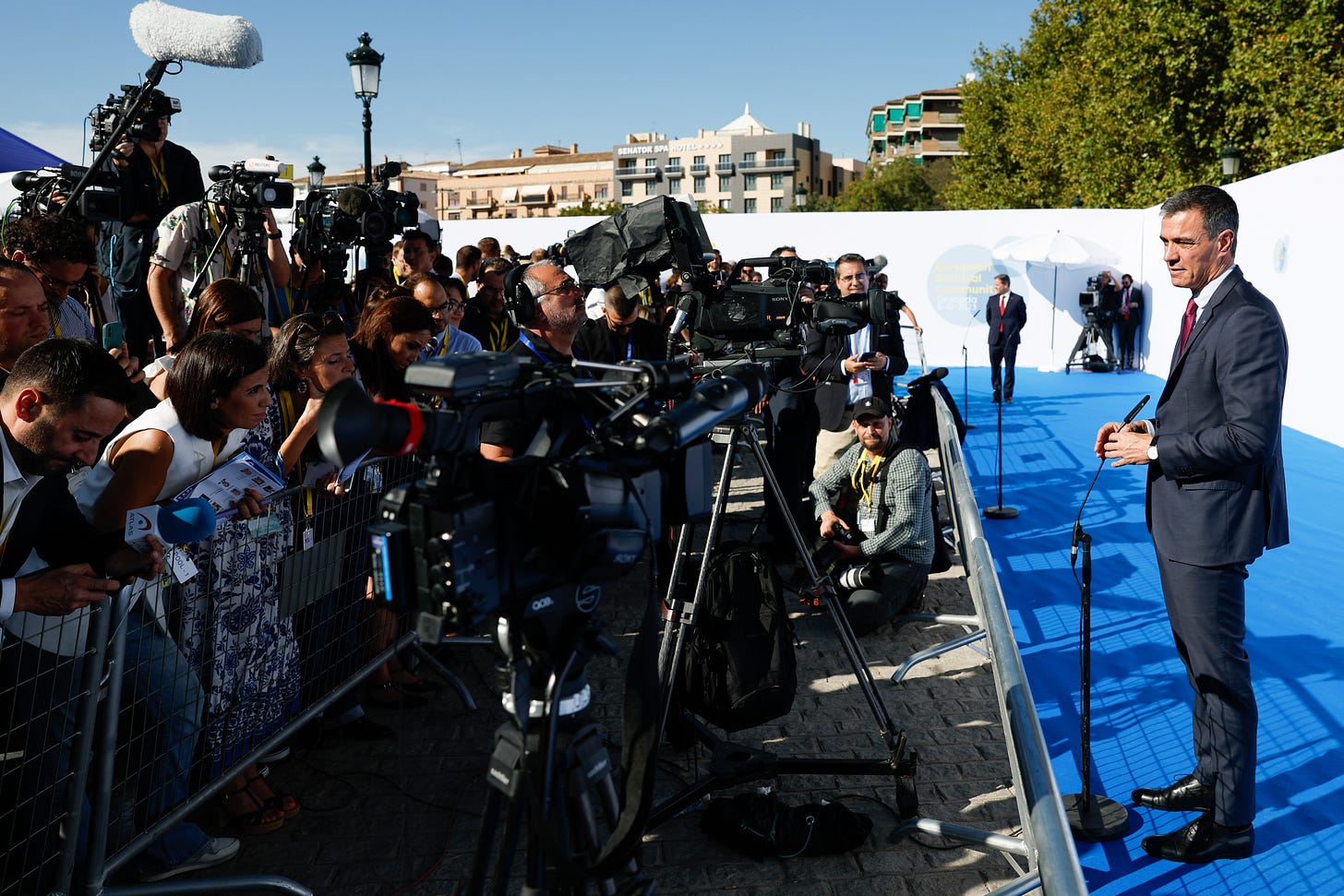Granada summit: two decades of EU accession false promises
Dangling the prospect of EU accession should not be used as a tool to achieve geopolitical goals for the West.
The leaders of the 27 member states of the European Union, plus leaders from 20 countries in Europe but not part of the EU, met today for the third European Community Summit in Granada, Spain. The forum, championed by French President Emmanuel Macron, is as yet ill-defined but could evolve into an outer tier for countries that are unwilling or unable to join the European Union. And for that reason, accession has been the big issue hanging over the summit.
Ukrainian President Voloymyr Zelensky came to Granada for today’s summit, and proponents of the county joining the union were hoping that this summit could bring an informal endorsement of starting accession talks with Kiev, with a more formal endorsement to come at the December European Council summit. That discussion will continue at an EU-leaders-only summit in Granada tomorrow. But by early this week it had already become clear that there are still significant reservations against the idea that wouldn’t not be overcome at this summit. And this morning, the previous European Commission President Jean-Claude Juncker infuriated the union’s Eastern members by bringing up the elephant in the room.
“Anyone who has had anything to do with Ukraine knows that this is a country that is corrupt at all levels of society. Despite its efforts, it is not ready for accession. It needs massive internal reform processes,” he told German paper Augsburger Allgemeine. “You shouldn’t make false promises to the people in Ukraine who are up to their necks in suffering. I am very angry about some voices in Europe who are telling Ukrainians that they can become members immediately.”
The comments cast a shadow over today’s summit, because they highlighted a complaint that core European capitals have long had about the EU accession process: that ever since Turkey was designated as a candidate in 1999 due to pressure from Washington and London, the process has been abused as a geopolitical tool to keep countries ‘on side’ with the American-led Western order rather than as a strategy for building a workable confederation of countries that can survive as a political union. Berlin and Paris opposed making Turkey a candidate, but they relented under considerable pressure from those who saw offering Turkey candidate status as a way to keep Ankara aligned with the West. It cannot be overstated just how much the mistakes made with Turkey have cast a shadow over the current question of Ukrainian accession, and this is a link few in Britain or America have been able to grasp.
The EU’s 27 leaders approved candidate status for Ukraine and Moldova to join the union in June 2022. But for most EU members from the bloc’s east, the process isn’t going fast enough. They want Ukraine to be given an unprecedentedly accelerated accession timeline, granted exemptions and privileges never seen before. But Western European capitals, where the subject of EU enlargement has been met with lukewarm enthusiasm over the past decade, have been much less receptive to EU membership for Ukraine.
The concerns about Ukraine can be divided into two categories; the short term and the long term. The concerns Juncker mentioned are more about the short term, since corruption is a fixable situation. But there are also the issues that are more permanent. One is demographics. Like Turkey, Ukraine’s large population and vast territory could be difficult for the EU to absorb, a bit like the US being asked to take on Mexico as the 51st state. The other issue is distance. Like Turkey, it is very far away from the core of the EU and it has problematic neighbors with active conflicts. If the EU were just a free trade area, these factors wouldn’t be an issue (like it was no issue for the US and Mexico to be in NAFTA together). But the EU isn’t just a free trade area, and making such a massive sudden change to the union could make the EU as a political unit unworkable. It’s the same issues which presented themselves with Turkey.
For many in Brussels, Berlin, Paris, Rome and Madrid, the pressure to admit Ukraine rapidly for geopolitical reasons sounds a little too similar to what happened with Turkey. Concerns about Ukraine joining the EU are much less about Ukraine itself, and more about what the EU would look like if Ukraine’s membership bid were to succeed. EU federalists tend to believe that the EU can afford to grant membership to the remaining countries in the Western Balkans because they are small and close. But the dream of an “ever closer union” would be imperilled if a country as large as Turkey or Ukraine were admitted into the bloc, as such an outsized union would be harder to run as a federation. The shift in the balance of power toward the east could also tilt the EU toward a direction more in line with Polish desires: an economic union without a common framework for foreign and security policy, and one that does not get involved in policing the rule of law among its members.
Two decades after accession talks with Turkey began, it is clear the country will never be in the EU. Whatever small possibility still existed died with the country’s election result in May. The EU has been left with a headache, forced to skate around an awkward truth: It cannot terminate a dormant accession process for a country that will almost certainly never be admitted into the EU, for fear of the geopolitical consequences of doing so. The concern is that, if Ukraine’s relationship with the EU isn’t discussed honestly and realistically now, 20 years from now the EU could find itself with another Turkey situation.





Let me start by eyerolling in Jean Claude Juncker's general direction. Why is ANYONE from the EPP allowed to open their mouths about corruption in accession countries anymore? Does anyone remember Manfred Weber's obamaesque red line about CER? Joseph Daul's "enfant terrible"? The YEARS they spend shielding Viktor Orban from any consequences in exchange for goodies for the CDU's clientele?
Bref, anytime someone from an EPP party brings up corruption in Ukraine or anywhere else on the planet, just assume they're worried about the competition.
"some voices in Europe who are telling Ukrainians that they can become members immediately."
Who? Name names. I don't think PiS wants to go anywhere near the topic at the moment.
I felt the same way about Zelensky basically lying on twitter about the "immediate accession", but at least the Ukraining government has learnt quite a bit about the accession process since then and have stopped selling it as an instant prize for heroism.
I'm not sure "keep Ankara aligned with the West" is a comparable argument to "You enlarge or you have bloodlands and instability and possible invasion of members like the Baltics for the foreseeable future". Was Ankara drifting away ever an existential threat?
"They want Ukraine to be given an unprecedentedly accelerated accession timeline, granted exemptions and privileges never seen before. "
I´m assuming this is the Baltics + the Czech Republic. Because otherwise, it's Ukraine's neighbours whose enthusiasm for them joining seems anything but guaranteed given recent developments. Given how most of them are positioned regarding EU reforms and unanimity, I'm afraid they'll have to adjust their thirst for cake. Cakeism is not just a British addiction.
"Like Turkey, Ukraine’s large population and vast territory could be difficult for the EU to absorb"
The territory argument makes sense for the CAP, but population? How much bigger is the Ukraine's population than Poland's? Even if two thirds of refugees return in peacetime (unlikely, but let's roll with it) Ukraine was one of the worst demographic performers on the planet even before the war. By the 2030s it's projected to have a smaller population than Poland's. There are arguments against enlargement to full membership I can see the merits of, but population is not one of them.
My sense is that if Ukraine was willing to talk about a firm timeline in which they would join the Eurozone post membership that would definitely turnaround some sceptics.